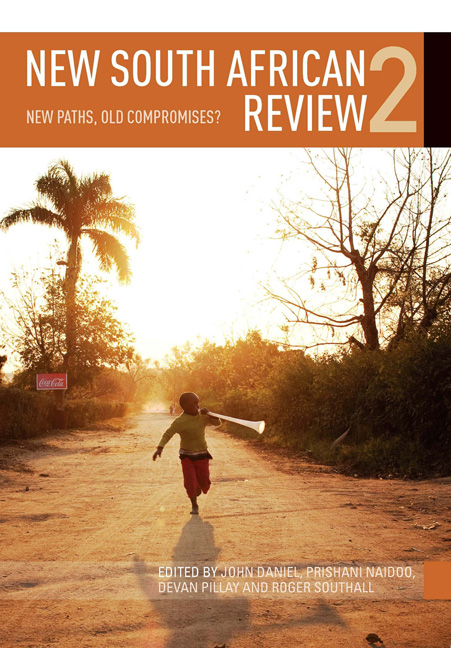Book contents
- Frontmatter
- Contents
- Preface
- Introduction: New paths, old (com)promises?
- PART 1 POLITICS AND INTERNATIONAL
- Introduction: The Zuma presidency: The politics of paralysis?
- Chapter 1 The Tripartite Alliance and its discontents: Contesting the ‘National Democratic Revolution’ in the Zuma era
- Chapter 2 The African National Congress and the Zanufication debate
- Chapter 3 Dancing like a monkey: The Democratic Alliance and opposition politics in South Africa
- Chapter 4 Democracy and accountability: Quo Vadis South Africa?
- Chapter 5 Civil society and participatory policy making in South Africa: Gaps and opportunities
- Chapter 6 Bring back Kaiser Matanzima? Communal land, traditional leaders and the politics of nostalgia
- Chapter 7 South Africa and ‘Southern Africa’: What relationship in 2011?
- PART 2 ECONOMY AND SOCIETY
- PART 3 ENVIRONMENT
- PART 4 MEDIA
- Contributors
- Index
Chapter 3 - Dancing like a monkey: The Democratic Alliance and opposition politics in South Africa
from PART 1 - POLITICS AND INTERNATIONAL
Published online by Cambridge University Press: 23 March 2018
- Frontmatter
- Contents
- Preface
- Introduction: New paths, old (com)promises?
- PART 1 POLITICS AND INTERNATIONAL
- Introduction: The Zuma presidency: The politics of paralysis?
- Chapter 1 The Tripartite Alliance and its discontents: Contesting the ‘National Democratic Revolution’ in the Zuma era
- Chapter 2 The African National Congress and the Zanufication debate
- Chapter 3 Dancing like a monkey: The Democratic Alliance and opposition politics in South Africa
- Chapter 4 Democracy and accountability: Quo Vadis South Africa?
- Chapter 5 Civil society and participatory policy making in South Africa: Gaps and opportunities
- Chapter 6 Bring back Kaiser Matanzima? Communal land, traditional leaders and the politics of nostalgia
- Chapter 7 South Africa and ‘Southern Africa’: What relationship in 2011?
- PART 2 ECONOMY AND SOCIETY
- PART 3 ENVIRONMENT
- PART 4 MEDIA
- Contributors
- Index
Summary
Political opposition parties in post-1994 South Africa have always had to confront the electoral dominance of the African National Congress (ANC), perpetually sustained as it is, not only by its firm grip on the state machinery but also by the historical memory it evokes among the majority black population as the party of liberation. Opposition parties have themselves come from a variety of political backgrounds – from alternative liberation traditions (such as the Pan-Africanist Congress and the Azanian People's Organisation); from ethnic exclusivism (the Freedom Front and, many would say, the Inkatha Freedom Party); from non-nationalist ideological perspectives (the Democratic Alliance and the African Christian Democratic Party); and from splits from other parties (the United Democratic Movement). But apart from the daunting prospect of overhauling the ANC, opposition parties have had to confront the continuous dangers of disagreement and disunity among themselves as they seek to share about a third of the total popular vote among the fifteen parties which have – at one election or another – gained representation in parliament. With fragmentation of the vote and a multiplicity of opposition parties and perspectives encouraged by the national list proportional representation electoral system, consolidation of the very diverse opposition vote has always been problematic, despite alliances formed at one time or another between various political parties. Nonetheless, the 2009 general election recorded three significant political developments – two of which, as we shall see, were to be confirmed by the results of the 2011 local government elections.
The first development was the further consolidation of the position of the Democratic Alliance (DA), which increased its share of the vote from the mere 1.73 per cent won by its predecessor, the Democratic Party (DP), in 1994 to 16.66 per cent in 2009; the second was confirmation of the eroding political base of the Inkatha Freedom Party (IFP), from 10.54 per cent of the vote in 1994 to a miserable 4.55 per cent in 2009; and the third was the arrival of what many portrayed as a significant new player on the scene, the Congress of the People (Cope).
- Type
- Chapter
- Information
- New South African Review 2New paths, old compromises?, pp. 68 - 82Publisher: Wits University PressPrint publication year: 2012



